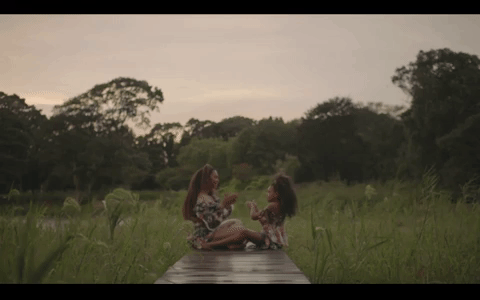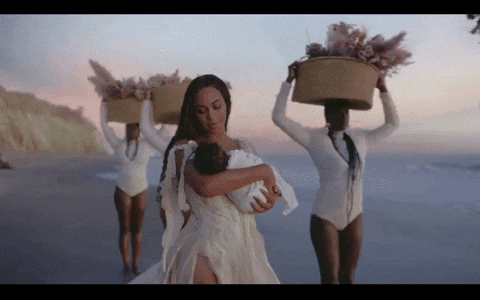Returning Home: Why ‘Black Is King’ Was An Affirmation Of My Search For Identity
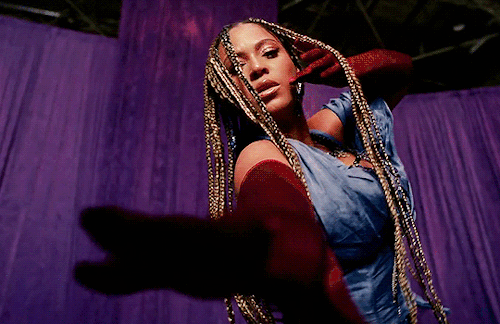
Who am I?
For such a profound question, it's an answer that steadily changes. I am always metamorphosing into new versions of me. It's the reason why I've gone years without a bio on my personal blog. When I hit a moment of satisfaction or shame within myself, I can't sit with or savor it long enough before I am reaching and aiming for something else. Something new.
This is the process of someone piecing together parts to make a whole.
I am constantly refining and redefining who I am. I've wrestled with understanding my existence and wrote about my racial-ethnic identity as a Black Latina for xoNecole years ago. Publicly, I've documented a deteriorating relationship with my mother and the search for my other half through an unidentifiable father. By the other half, I do not mean in respect of another human soul intertwined in harmony with my own being, although not knowing the origins of my birth story did play a vital role in how I sought and see love. There are so many moving and missing parts to me. This evolutionary story of who am I and the road to self-actualization is why I find comfort in Beyoncé's visual albums, more often, than in the music itself. She is always giving me what I need when it comes to identity.
 Beyonce Lemonade GIFGiphy
Beyonce Lemonade GIFGiphyBey's film version of Lemonade came at the right time in 2016. Perhaps even divine timing for most of us, myself included. We dissected pieces of the 65-minute film in academia, through blog posts, and over social media.
Her personal story—this beautiful fusion of intuition, denial, anger, apathy, emptiness, accountability, reformation, forgiveness, resurrection, hope, and redemption—mirrored our own Black lives.
Our womanism and the fruits of our wombs. Our homes and our healing. Lemonade's release happened around the time of my own birth, a Saturn return, the elements of water, and womanhood centering itself in my own world. It was life-changing for me.
Black Is King is no different.
Sunday was spent with my now three-year-old who thought an afternoon in bed would bring another edition of Frozen II. I wanted to push Black imagery to the forefront. To accompany the darkness of Black Is King's opening, we heard:
"I feel like I'm not a king yet. But, like, I got potential for it, you feel me? But I'm not there yet, you feel me? Like, I know I got the capabilities to. But sometimes I don't know how to navigate."
The opening felt like home, a familiar territory. I know that even with gaps in between the early chapters of my life, I still have lands I need to explore within myself. Who am I as the (great)granddaughter of Alabamian women and military men? Who am I beyond them? Black Is King's purpose is to transcend brick walls and to "come home to" who we inherently are. This has been the mission of my thirties thus far.
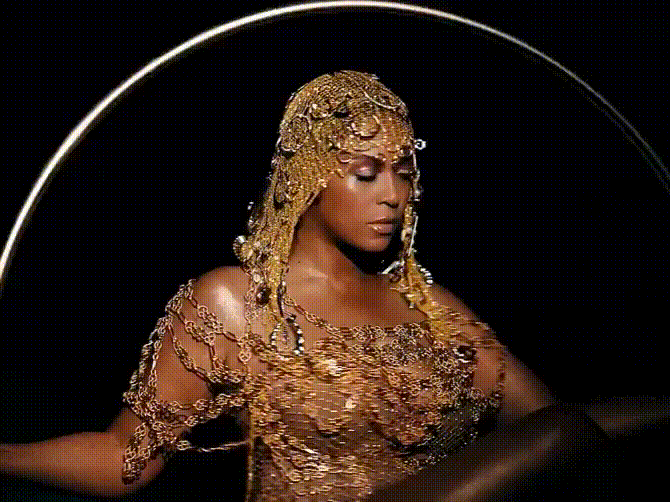
"Meant to celebrate the breadth and beauty of Black ancestry," Beyoncé said of the film's intent:
"We are all in search of safety and light. Many of us want change. I believe that when Black people tell our own stories, we can shift the axis of the world and tell our REAL history of generational wealth and richness of soul that are not told in our history books. With this visual album, I wanted to present elements of Black history and African tradition, with a modern twist and a universal message, and what it truly means to find your self-identity and build a legacy…This is a story of how the people left MOST BROKEN have EXTRAORDINARY gifts."
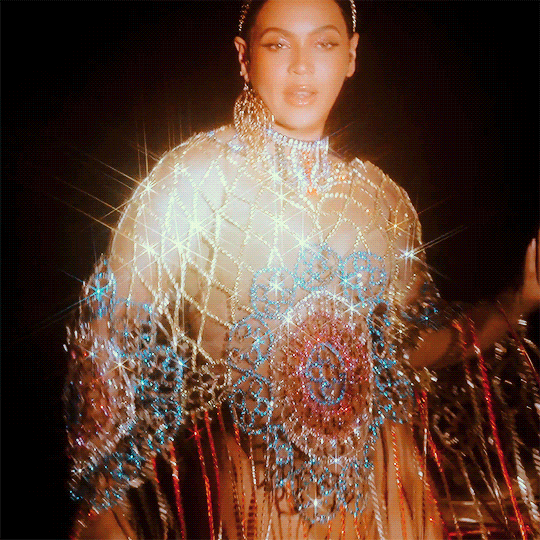
The Lion King was always that one childhood film that had endless knowledge to draw from, but I was always pulled to the lesson that it's important to (1) know who you are and (2) know where you come from. Bey's incorporation of Africa's lands, its native people, its color, and culture, alongside her family, reiterated just that.
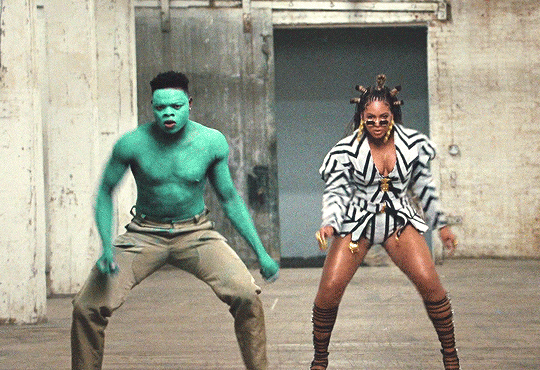
It was in Blue Ivy's showcase of sass and stardom at the tender age of 8 that warmed me throughout, knowing there was a Brown skin girl who would grow up with the awareness of who she was and who came before her.
So many of us were once Black girls who transformed into Black women with no recollection of the past that made us.
With tears, I celebrated the rising star that fell from the sky in the form of a meteor within the film, knowing Blue and Rumi were the exception to this visual dedication to Sir, and hoping the same for my own children. This was a moment of hope.
It was in the mesh of flesh in Kelly Rowland and Beyoncé's intimate face-to-face embrace; Bey's insight on women as saviors and protectors with our own set of plights; the encouraging poetry of Warsan Shire in lines like "Life is a set of choices. Lead, or be led astray. Follow your light. Or lose it"; and the joyous inclusion of Afrofuturism at a time where tomorrows aren't promised for Black folks, that allowed me to see how Black Is King is more than just a retelling of a classic Disney movie.
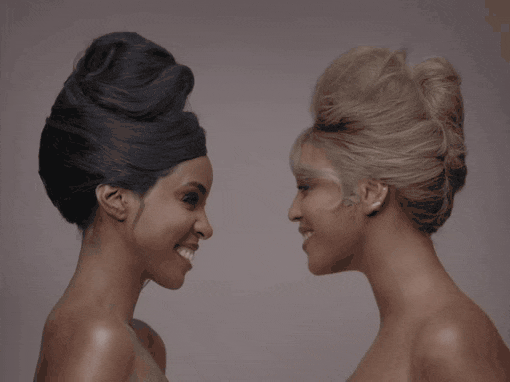
Black Is King/GIF
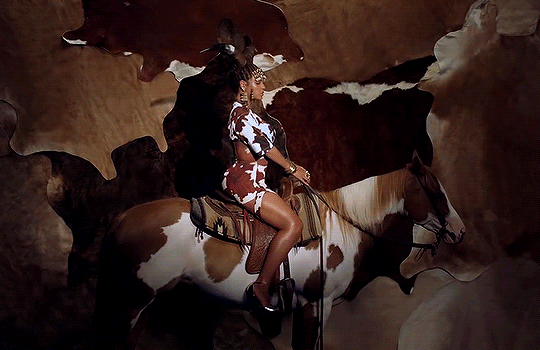
It was in these visual connections and pleas to return to our ancestry that confirmed for me to drop my reservations about wandering into DNA-testing territory, in order to glue the holes of my story together for the sake of myself and the children rooted in me. Introspection is dark and heavy. I have yet to weave together the puzzles by way of genetic testing, out of skepticism. What will I find? What is in me? Who's "blood keeps the score of [my] blessings and [my] trials?"
Learning of your lineage and coming into yourself comes with criticism—internally and from outside forces.
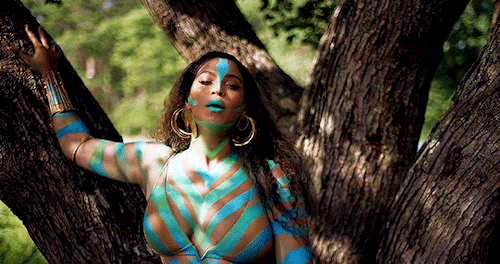
Black Is King/GIF
As evident in the film's growing opposition. Appropriation, a lack of understanding to an unfamiliar culture that many are attempting to reclaim, and BIK being seen as "an African aesthetic draped in capitalism" are all understandable critiques worthy of a deeper exploration into where African-Americans fit in, and what table we get to sit at.
Beyoncé is no stranger to criticism, nor is she exempt because of her status in pop culture on an international scale, or how she's elevated Blackness in modern times.
But to knock the messenger before weeding out the message is something I can't get behind (and no, I have never been a devout member of the Hive). Jay said it excellently in Black Is King: "Understand that good and evil often appear together. Nothing is complete on its own...It's not always a battle; it's a conversation."
Maybe the art, the film's symbolism, and its relation to my own life blinds me to "the bigger issues", truth be told. But my identity and understanding my existence is just as important. To this I sing, "They'll never take my power, my power, my power..."
Beyoncé associating Blackness with wealth/regality is corrective promotion and y’all need to be happy about it. too often blackness is associated with struggle/poverty. and the messaging I get from her often is that wealth and regality lives inside us, it’s not always material.
— coffee bae (@iamsashakae) July 31, 2020
"To live without reflection for so long might make you wonder if you even truly exist."
Who are you?
For years, I was bound to the narrative that I was solely a descendant of enslaved people with ties to Latin cultures and African countries. After mass consumption of films centered on that history as a child, I was turned off by "urban novels" that pushed hood love chronicles, life in projects and poverty, and the countless ways incarceration plays a guest role in our upbringing, as classic as they are.
My Black card would be revoked for sure if I told you how many street lit books I didn't read. Not because of access, but because I wanted a new account of how my life could possibly be. Because the school wouldn't teach it. Because American history tried to erase it—word to Nick Cannon. It's why I've stopped watching movies on slavery made by white men that win awards and yearn for new stories by way of my own telling or others.

Black Is King/Disney Plus
Perhaps I am not an offspring of African royalty, a reoccurring point made by critics from the African diaspora on Black Is King. Everyone isn't cut from the finer cloths and Africa shouldn't be romanticized by fantastical accounts of its history and inaccurate reflections of its modern times. I know this. But what I also know is:
I know that my resilience as a Black woman stems from some deeply rooted part of me. I know that my ability to make do with little and transform it into the most as a Black mother is ingrained in the women buried inside. I know "the Orishas hold [my] hand through this journey that began before [I was] born."
As a storyteller, I know the most used line in The Lion King to be true: that "we are all connected in the great circle of life." I am trying to piece together my own constellations and find my way home in a human game of chess.
I am both the pawn and a Queen.
Featured image by Black Is King/GIF
- Black Movies: Black History Month List - xoNecole: Women's Interest ... ›
- The Queen Of 'Black Is King': 6 Times Beyoncé Reminded Melanin ... ›
- Beyonce Motivation Meme You Have The Same Hours - xoNecole: Women's Interest, Love, Wellness, Beauty ›
- My Black Is Beautiful, Lisa Nichols Queen Latifah - xoNecole ›
This Is How To Keep 'Holiday Season Stress' From Infecting Your Relationship
Hmph. Maybe it’s just me, but it seems like there is something really weird happening in the fall season air (because winter doesn’t officially begin until December 21) that cuddle season is in full swing while break-up season is as well. In fact, did you know that break-ups are so popular during the holiday season that December 11 is deemed Break-Up Day?
The reasons why relationships shift around this time vary; however, I did both roll my eyes and chuckle when I read that a very popular one is because it’s an easy way to get out of getting one’s significant other a Christmas present. SMDH.
Anyway, I personally think that the less shallow folks out here may contemplate calling things “quits” or they at least distance themselves a bit from their partner (and what I’m referring to is serious relationships) due to all of the stress and strain that oftentimes comes with the holidays whether it be financial, familial, due to their tight schedules or something else.
Listen, I would hate for you and your man to miss the fun and happiness of experiencing this time of year, all because you are so overwhelmed or irritated that you can’t really enjoy it. That’s why I have a few practical tips for how to avoid allowing the typical holiday season stress from INFECTING your relationship.
Manage Your Expectations
 Giphy
GiphyUnmanaged expectations. If there is a main reason why the holiday season tends to be so stress-filled for so many people, I’d bet good money that this is the cause. And when you’re in a long-term relationship, expectations can manifest themselves in all sorts of cryptic and/or unexpected ways. You might have relatives who assume that you are going to be with them for Thanksgiving or Christmas when you have other plans in mind. You might be thinking that you are going to spend one amount for presents while your man is thinking something totally different. When it comes to scheduling, your signals may be crossed.
And you know what? To all of these scenarios, this is where clear and consistent communication come in. Don’t assume anything. Don’t dictate anything either. From now until New Year’s, mutually decide to check in once a week, just to make sure that you are both on the same page as it relates to the holidays and what you both are thinking will come along with it. The less blindsided you both feel, the less stressed out you will be. Trust me on this.
Set (and Keep) a Budget
 Giphy
GiphyOkay, so I read that last year, 36 percent of Americans incurred some type of holiday-related debt. Hmph. Last year, there was still some sense of normalcy in this country, chile, so I can only imagine what finances are gonna look like over the next several weeks. That said, since I don’t know a lot of people who don’t find being broke stressful, make sure that you and your bae set a budget and then stick to it this year — no ifs, ands or buts.
Because really, y’all — it doesn’t make sense to deplete savings and/or max out credit cards for a few days of giggles only to be damn near losing your mind because you don’t know how to make ends meet come Dr. Martin Luther King, Jr. Day.
And by the way, this tip doesn’t just speak to things like food and gifts; I also mean travel. If it doesn’t make a ton of sense (or cents) to be all over the place this year — DON’T BE.
Keep Matthew 5:37 at the Forefront
 Giphy
GiphyIf off the top of your head, you don’t know what Matthew 5:37 says, no worries, here ya go: “But let your ‘Yes’ be ‘Yes,’ and your ‘No,’ ‘No.’ For whatever is more than these is from the evil one.” That verse right there? Oh, it’s a boundaries lifesaver! I say that because do you see “maybe” or “I’ll think about it” in there? Nope. LOL. It says that you should tell people “yes” or “no” and leave it at that — and that complements Anne Lamott’s quote, “’No’ is a complete sentence” impeccably well. Yeah, you’ve got to remember that anything beyond a yes or no to a request is privileged information; you don’t owe anyone details or an explanation.
Besides, if you are really honest with yourself, when someone asks you something and you give a “Umm, let me think about it” kind of reply, more times than not, you already know what your answer is going to be — so why not let you both off of the hook? Give your response. Commit to that. And let everyone (including yourself) get on with their lives and schedules.
I promise you that when it comes to those holiday parties, you are pissing more folks off by not RSVP’ing or doing so and not showing up than just saying, “Thank you but not this year” off the rip.
Remember That Your Personal Space Is Privilege Not a Right
 Giphy
GiphyA friend of mine recently bought a new house and invited me over to come see it. He’s a single man with no children, so as I was taking in all of the space that he had, especially as I walked through his finished basement, I joked about relatives coming to live with him. “Hell no” and “absolutely not” were pretty much his immediate responses as he went on to say that some folks even had the nerve to be offended when he told them that he had no intentions on taking DNA in.
Ain’t it wild how people think that your stuff is their right? And yes, that brings me to my next point. Your home is your sanctuary space. If you want to host folks this year — cool. If not, ALSO COOL. Please don’t let folks (family included) guilt you into how they want you to act or even into what they would do if the shoe was on the other foot. You are not them — and as one of my favorite quotes states, “If two people were exactly alike, one of them would be unnecessary.” (A man by the name Larry Dixon said that.)
Hell, my friends? They know that I am good for sending them random things that they need or even want all throughout the year. Coming over to hang out at my pace, though. Uh-uh. Chalk it up to being a card-carrying member of the ambivert club yet I like keeping my living space personal — and I sleep like a baby, each and every night, for feeling that way.
Always remember that your space, your time, your resources, your energy and shoot, yourself period (including your relationship), are all things that are your own. You get to choose how, when and why you want to share them. The holiday season is certainly no exception.
Cultivate Some “You Two Only” Traditions
 Giphy
GiphyIt’s not uncommon for some couples to hit me up after the holiday season to “detox.” Sometimes it’s due to the financial drama (and sometimes trauma) that they experienced. Sometimes it’s because they allowed their relatives (especially in-laws) to get more into their personal business than they should’ve. More than anything, though, it tends to be because they didn’t get enough quality time together and so ended up feeling “disconnected.”
Please don’t let that happen. Listen, I’m not even a holidays kind of woman and yet, I will absolutely sit myself down with some hot chocolate and chocolate chip cookies to enjoy a Hallmark holiday film or two. Aside from the fact that most of them are lighthearted and sweet, I also like that they usually focus on couples loving on each other amidst all of the holiday beauty and ambiance — which is something that all couples should set aside some time to do.
Maybe it’s a vacation. Maybe it’s a staycation. Or maybe it’s my personal favorite, A SEXCATION. Whether it’s for a few days, the weekend or even overnight — don’t you let the holidays go by without setting aside time for you and your man to celebrate one another. Don’t you dare (check out “Are You Ready To Have Some Very Merry 'Christmas Sex'?”).
GET. SOME. REST.
 Giphy
GiphyI once read that 8 out of 10 people get stressed out over the holidays and 3 out of 10 lose sleep during to it — and when you’re stress-filled and sleep-deprived, that can absolutely lead to hypersensitivity, making mountains out of molehills and even not being in the mood for sex.
Your relationship can’t afford to go through any of this, so definitely make sure to prioritize rest. I don’t care how unrealistic it might seem during this time, sleep should never be seen as a luxury; it will always and forever be a great necessity.
That said, try to get no less than six hours of shut-eye in (check out “6 Fascinating Ways Sex And Sleep Definitely Go Hand In Hand”) and even ask your bae to take a nap with you sometimes (check out “Wanna Have Some Next-Level Sex? Take A Nap, Sis.”). Not only will sleep help to restore your mind, body and spirit but, when it’s with your partner, it’s an act of intimacy that can make you both feel super connected, even in the midst of what might feel like chaos.
___
Holiday season stress is real. Still, never give it the permission or power to throw your relationship off. Put you and your man first and let the holidays be what they are gonna be, chile.
Let’s make things inbox official! Sign up for the xoNecole newsletter for love, wellness, career, and exclusive content delivered straight to your inbox.
Featured image by Shutterstock
How To Avoid Being An Emotionally Impulsive Spender This Holiday Season
Geeze. Can you believe that we are just a few days out from another Christmas? Yeah, me neither. In fact, because I’m not a holidays person myself (check out “So, What If You Don't Observe Holidays?”), it wasn’t until one of my clients was venting about how stressed out she was due to all of the holiday season procrastinating that she had been doing that I realized just how fast December is actually flying by.
If, like her, you’re feeling frazzled because, although you told yourself last year that you weren’t going to wait until the last minute to “handle your business,” you ended up doing exactly that, fret not. I’ve got 10 tips that can keep you from making emotionally-triggered decisions as far as your financial expenses are concerned. Merry Christmas. #wink
1. Create a Budget. Stick to It.
 Giphy
GiphyBudgets, boy. I recently read that one of the reasons why they don’t work for a lot of people is because many folks don’t have a clue about how much money they spend on a monthly basis to begin with. SMDH. That said, at the end of the day, it’s important to remember that a budget is simply setting boundaries/limits on your spending — and being intentional about moving in this fashion is always a wise move; especially when it comes to this time of the year…especially being that it’s typical for half of all Americans to take on some type of holiday season debt with 17 percent needing six (or more) months to pay it off.
Know what can prevent this kind of financial chaos? A SPENDING BUDGET. Tips for how to create one of your own this year can be found here.
2. Never Shop When You’re Stressed or Pressed
 Giphy
GiphyYou know how they say that it’s not a good idea to go grocery shopping when you’re hungry? Although the holiday season can be a stressful time, avoid shopping for gifts (or décor or food for recipes) when you are feeling stressed out or pressed for time. More times than not, that cultivates anxiety which could cause you to either purchase things that you don’t really want or to spend money that you don’t really have (P.S. If you’re relying on credit cards, that qualifies as money that you don’t really have. Just sayin’).
3. Don’t Keep Up with the Joneses
 Giphy
GiphyKnow something else that can stress you out: trying to keep up with the Joneses. And y’all, now that we have social media, the reality is that envy is at an all-time high. That’s because it can be really easy to watch holiday engagements, holiday trips and folks bragging about the things that they’ve received in times past, only for you to find yourself wishing that you were them — or putting pressure on yourself and those in your world to keep up.
Listen, it is King Solomon who once said, “So are the ways of everyone who is greedy for gain; It takes away the life of its owners” (Proverbs 1:19 — NKJV) and “A sound heart is life to the body, but envy is rottenness to the bones” (Proverbs 14:30 — NKJV) and he’s considered to be the wisest man who ever lived (during his time — I Kings 4:30). Yeah, both of these verses are a spiritual reminder that whatever you are planning to do or give, do it out of the goodness of your heart — not so that you can low-key “outdo” the next guy.
4. No Need to “Tit-for-Tat”
 Giphy
GiphyThis one might be a bit controversial yet I’m totally okay with that. I don’t care what the occasion is, no one is OWED a present. A gift is a voluntary token of one’s appreciation or affection. That said, if you decide to give someone a present this year, don’t automatically expect something in return. If you get something, cool. If not, if you were giving for the right reasons, it really shouldn’t matter (RIGHT?). On the flip side, if someone decides to get you something and you don’t have something to offer in return, also cool.
Other than going to someone’s home for a holiday dinner or party, for anyone to feel like they should have something in hand because someone else does…that’s not giving, that’s competing — and that absolutely should not be the spirit that you are in (or around) during this time of year.
Again, a gift is not an obligatory thing. If you’ve always thought otherwise, it’s time to do some serious reprogramming.
5. Avoid the Pressure to Buy for Lots of Adults
 Giphy
GiphyLast month, Newsweek published an article that said it’s wise to not spend a ton of money purchasing gifts for adults. A financial expert in the piece said that it’s best to buy for kids because, more times than not, you’re going to get adults something that they already have a lot of, they don’t really need or they’re not going to use (beyond maybe regifting) anyway.
If you’re not feeling that insight, my take would be to exchange names and set a price cap for the grown folks. I say that because, I don’t think that people ever outgrow wanting something over Christmas. It’s just that the over-the-top energy should be reserved for the kiddies — and even then, the “4-gift rule” (want, need, read, experience) is probably your best bet for them…financially and otherwise.
6. Go for Thoughtful over Expensive
 Giphy
GiphyIt’s kind of wild how much close-to-torture folks send themselves through to purchase gifts that, a good 6-8 months now, most folks aren’t even going to remember. That’s why it’s also a good idea to purpose in your mind to get something thoughtful over expensive.
Honestly, that’s a big part of the reason why Etsy continues to be a go-to for gifts (for every occasion) for me. It’s because you can oftentimes get things customized/personalized which ends up meaning so much more to people than something that you bought at a generic department store that might have a high price tag yet still lacks in sentimentality and deep meaning.
7. Use Coupons and Promo Codes
 Giphy
GiphyCoupons (and promo codes) are a slippery slope in the sense that…they remind me of when I used to go overboard while thrift store shopping. I say that because, just because I might find several bomb dresses for under $20, what am I going to do with 50 of ‘em (over time)? It’s just as much of a waste of money as buying couture if neither option gets much use.
And that’s kind of the thing about coupons and promo codes. Some people end up overspending because they rationalize that so long as there are discounts attached, it’s all good. At the same time, this doesn’t mean that you should forego coupons and promo codes altogether. The key is to put together your shopping list (and budget) and then use discounts specifically for those items. If you do this, you could save well over $1,000 annually (at least, depending on what you decide to buy).
8. Avoid Add-Ons
 Giphy
GiphyYeah. Dodge add-on expenses. Add-ons like what? The first thing that comes to my mind is a warranty. What’s the chance that someone is actually going to need that? Another example is paying for things to be “professionally” gift wrapped. Chile, throw that stuff in a gift bag with some tissue paper and go on about your day. All good.
9. Rethink Gift Cards
 Giphy
GiphyIf there is any time of the year when there is a noticeable hike in gift card purchases, now would be it. And although they are a convenient approach to gift giving, at the same time, many come with hidden fees, the full amount oftentimes goes unused (which ends up being a waste of money) and they do come with expiration dates that are oftentimes forgotten.
So, if you’re someone who likes to wait until the last minute to do your holiday shopping, resist the urge to impulsively pick up a handful of gift cards. Unless it’s to a place that you know someone is going to use within the next few months, they could end up in somebody’s kitchen drawer for the next couple of years. And what a waste that would be.
10. They’ll Get It When They Do. And That’s Okay.

=
GiphyOne more. Although it is super thoughtful and proactive to get people their gifts in time for whatever occasion you purchased them for, if trying to reach that goal is going to require paying for rush shipping that is damn near as high as the price of gift or spending a lot of gas money that you don’t have at the moment to drive miles and miles away — take the pressure off to spend a ton of cash just to make sure that something arrives at December 25. Listen, through doing business with Etsy, I have learned that through this administration, there are all sorts of tariff issues going on and the USPS is slower than ever too, so paying more may not guarantee much.
The hack? Send a message that something special is coming…soon enough. The thought really is what counts (more times than not); plus, it builds anticipation of something good coming, even if it’s after all of the Christmas Day hoopla. And no one (with sense) is going to have a problem with that.
Now don’t you feel better? Happy Holiday Shopping, sis.
Let’s make things inbox official! Sign up for the xoNecole newsletter for love, wellness, career, and exclusive content delivered straight to your inbox.
Featured image by Shutterstock



